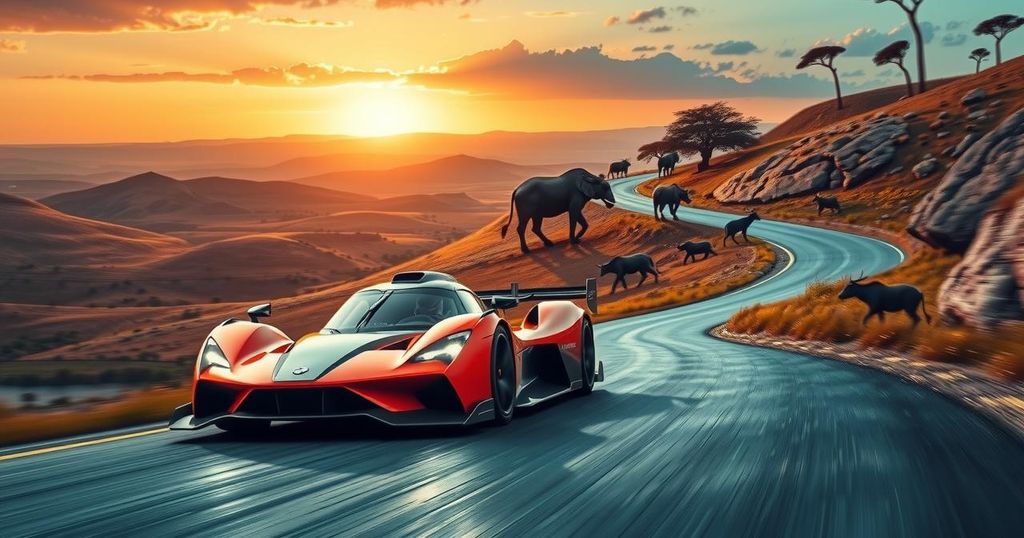Rwanda and South Africa Compete for Formula 1 Grand Prix in Africa

Rwanda and South Africa are competing to bring Formula 1 back to Africa, aiming for a grand prix in 2027 after a 30-year absence. Rwanda’s innovative, sustainable approach contrasts with South Africa’s historical Kyalami circuit. While drivers express excitement for the return, both nations face financial and infrastructural challenges as they strive to secure F1’s prestigious event.
After more than three decades without a Formula 1 race in Africa, Rwanda and South Africa are competing to bring the prestigious event back to the continent, aiming for a grand prix in 2027. Lewis Hamilton and other drivers are enthusiastic about the potential return, noting Africa as a promising location for expanding the sport’s audience. Rwanda’s proposal emphasizes sustainability and scenic landscapes, with support from FIA President Mohammed Ben Sulayem, who stated, “Africa deserves a F1 event and Rwanda is the best place.”
Rwanda plans to construct an F1 circuit near Kigali, featuring a design by Alexander Wurz that incorporates dramatic elevations and sharp corners. Key figures, such as Max Verstappen, have praised Rwanda’s terrain for racing, but the infrastructure must meet rigorous FIA safety standards, alongside the development of required facilities. This initiative is part of Rwanda’s broader strategy to position itself as a global sports hub, which could significantly boost its tourism economy.
Despite Rwanda’s ambitious plans, challenges such as high costs and allegations of ‘sportswashing’ have been raised. Critics argue that Rwanda’s investments in sports serve to improve its international image amid accusations of human rights abuses. While government representatives dismiss these claims as distractions, Human Rights Watch emphasizes serious concerns about Rwanda’s governance and its foreign interventions affecting regional stability.
In contrast, South Africa relies on the historic Kyalami circuit, which hosted numerous F1 races before. With fewer upgrades required, the South African bid is gaining momentum, supported by a government committee and significant sponsorship interests. Sports Minister Gayton McKenzie has highlighted the economic benefits of hosting the F1 event, recalling skepticism surrounding the 2010 FIFA World Cup, which ultimately proved successful for the country.
Both nations, while presenting different visions, grapple with substantial financial obligations should they secure F1’s return. The successful host will need to manage annual promotion and maintenance fees, alongside ensuring adequate accommodations for visitors. As preparations advance, the anticipation surrounding a potential F1 return to Africa grows, promising a momentous occasion for the continent’s motorsport landscape.
The bid for Formula 1’s return to Africa comes after a long hiatus since the last race held on the continent over 30 years ago. Rwanda and South Africa are both vying for the opportunity to host a grand prix, each presenting distinct proposals that highlight their unique geographic advantages and investment potential in motorsport. The involvement of key figures in the sport, such as Lewis Hamilton and FIA President Mohammed Ben Sulayem, underscores a collective desire to see F1 flourish in Africa, providing a platform for engagement with new audiences and boosting regional economies through tourism and infrastructure development.
In summary, the competition between Rwanda and South Africa to host the next Formula 1 grand prix highlights both nations’ aspirations to re-establish motorsport in Africa. With Rwanda focusing on sustainability and innovation through a new circuit, and South Africa leveraging its historical Kyalami track, both bids face significant challenges, including financial commitments and the need for infrastructure upgrades. As the process evolves, the potential arrival of F1 could signify a transformative era for African motorsport, promising economic and social benefits for the chosen host.
Original Source: www.bbc.com




